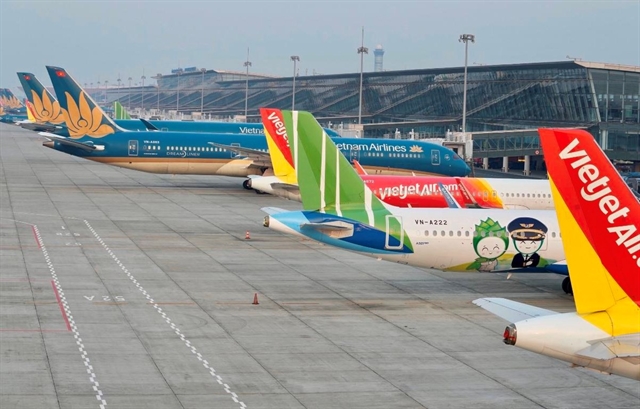 Economy
Economy

 |
| Aircrafts at Nội Bài International Airport, Hà Nội. Vietnamese airlines have been facing difficulties to retain slots at foreign airports. — VNA/VNS Photo |
HÀ NỘI — The Civil Aviation Authority of Việt Nam (CAA) said that it would give its best efforts to negotiate to keep slots at foreign airports for Vietnamese carriers.
CAA Director Đinh Việt Thắng said that Vietnamese carriers were struggling with slot retention in a declining market. Thắng said that some airlines must operate flights with low seat occupancy to keep the slots.
The aviation market has not fully recovered to the pre-pandemic level, Thắng said, adding that airlines have struggled to retain slots at foreign airports. Carriers could keep slots if they ensured the required slot usage rate, which is a challenge due to low market demand.
Thắng said that CAA was working with foreign aviation authorities to provide support to airlines based on the principle of reciprocity.
However, there are markets whose airlines do not operate flights to Việt Nam such as Australia, India and the UK.
In difficult cases which go beyond the capacity of the CAA, it will propose diplomatic negotiations at higher levels.
In the domestic market, airlines must ensure a slot usage rate of at least 80 per cent to be able to retain slots for the next scheduling season under the established regulations. Flexible management must wait for amendments to the established regulations.
Some airlines proposed to swap slots of routes which were not used up, such as to China, for routes with higher demand such as to the South Korea. The proposal sounded reasonable, he said.
He said the CAA would study the proposal and send it to the Ministry of Transport for appropriate amendments.
The CAA’s statistics showed that the aviation market handled about 34.7 million passengers in the first half of this year, up 49.6 per cent against the same period last year. Of the figure, international passengers totalled 14.7 million, five times higher than the same period in 2011 and equivalent to 73.5 per cent of the same period of 2019.
The total cargo volume was estimated at 483,000 tonnes, dropping by 26 per cent.
According to Đinh Việt Phương, chief executive officer at Vietjet, airlines are facing difficulties because the number of flights increased but the number of passengers did not. Seat ultilisation ratio decreased on low purchasing power and low demand. The number of international visitors increased compared to 2022 but had not reached the pre-pandemic level.
The travelling demand from Northeast Asia was below expectations. Countries like China and Japan are promoting domestic tourism.
Some flights from Japan had occupancy rates of only 40 per cent, even though it is meant to be peak season.
Phương said even though the number of passengers has decreased, airlines still have to fly regularly to keep their slots in foreign airports.
Slots are a resource, but the management of them should be flexible and efficient, Phương said.
According to Vietnam Airlines, the seat occupancy ratio of international flights was only around 67-68 per cent this year, 10 per cent lower than in 2019.
Besides, airlines also faced other difficulties from rising fuel cos and a slump in value of the Vietnamese đồng against the US dollar. — VNS




